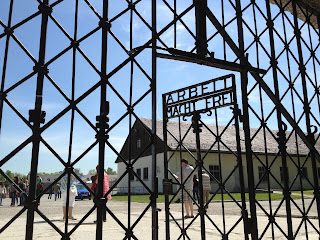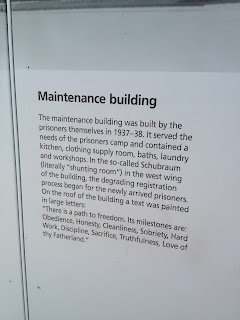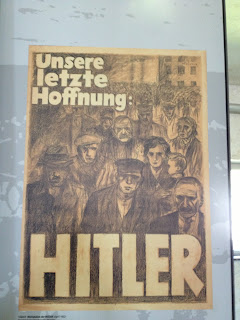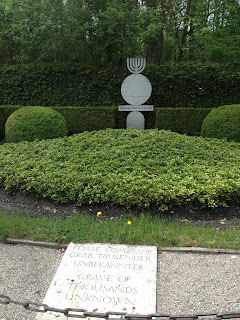Guten Morgen!
I began my second day in Munich with a run around a nearby park to try and atone for the fact I'm eating Nutella 3 times a day. It was lovely and green. The park, not the Nutella.
I checked out of my hostel, the Meininger, and headed to the haptbahnhof. I stored my backpack in a locker and set course for my day's destination: Dachau.
I want to begin by saying that it's impossible to visit Germany without an awareness of its historical significance. Almost every place I went I could see the lasting impression WWII has made on this nation and its people. Yes, WWII is a huge part of American history too, but Germany is still bearing a lot of visible scars that we aren't. One of those scars is Dachau, a concentration camp form WWII. This is the legacy that Nazi Germany burned in everyone's minds and I wanted to see it.
*This is a disclaimer to anyone reading this post that this is some sobering material, but I won't post any graphic images.
It was always part of my plan to take the 20 minute train ride from Munich to visit the Dachau Concentration Camp Memorial. I needed to see it for myself and I wanted to pay my respects to the souls that were lost in a way that seems unfathomable today. I was prepared to have an emotional response to my visit, but mostly I wanted knowledge. In school we're taught about
what happened during the holocaust, but I was hoping at the museum I could learn a little bit more about the "hows" and "whys."
I hopped off the bus at the Dachau Memorial Site and I was taken back by what a beautiful day it was. The images in my head of this place and on the website are gray and dreary. I was greeted by a bright blue sky and green trees. I walked into the memorial information center and asked to join a tour group because I wanted to be able to ask questions. Unfortunately, I just missed one and had 90 minutes until the next. The lady at the counter suggested I go check out the museum while I was waiting.
I walked down a path lined with trees until I came to an iron gate with the well-known slogan "Arbeit Macht Frei." It translates to "Work Will Set you Free," a lie of course.
I walked to another small plaque that says:
"There is a path to freedom. Its milestones are: Obedience, Honesty, Cleanliness, Sobriety, Hard Work, Discipline, Sacrifice, Truthfulness, Love of thy Fatherland." More lies to the prisoners of course, but somehow you want to believe it's true.
I entered the museum and found what I was looking for: a detailed history of how Hitler and the Nazis came to power.
I realize that anyone reading this might already know the history or could get a far more accurate explanation by just looking it up, so I'll spare you the details. Basically, it's a long road to justify the extermination of an entire people. The propaganda art was fascinating to me.
Adolf Hitler took power in 1933 and Dachau opened shortly after. It was the first concentration camp and the only camp to last from 1933 to 1945. At first, the camp was strictly for Hitler's political opponents. The public was told they were sent there to "make them better Germans."
I learned all of this before my tour group and it was perfect because the guide picked up right where I left off. She started talking about how propaganda portrayed the early prisoners as the anti-nationalist, leeches of Germany. So when the Nazis said they were sending "lazy, Jewish intellectuals" to the camps to learn how to become hardworking Germans, people didn't mind.
Also, the early positive propaganda for Dachau was overwhelming. There are pictures in magazines of inmates smiling, working hard, and having a better life than they would otherwise. There was even an article claiming that the inmates were getting a pool for leisure time. This was far from the truth. Any person who entered Dachau was stripped of all human dignity, beaten, and broken. I should also clarify that Dachau was not a death camp. People were not
sent there to die, but to work. This work just very often resulted in
death.
Once 1938 rolled around, the Germans stopped sugar-coating it and the propaganda changed. Dachau was no longer presented as a place for people to become good German citizens, but a place to punish society's undesirables: Jews, gypsies, homosexuals, criminals, the disabled.
At that point in the tour, I asked our guide, "Did the S.S. (the guards) like their jobs or did they feel they had no choice but to work there? Was this all just to feed their families, but they secretly hated it?"
She responded: "The members of the S.S. were all voluntary. It was an honor to be a part of it and the SS commanded a lot of respect in Germany. It was extremely well-paying too. Also, their work was so compartmentalized that none of them were made to feel directly responsible for the deaths. One guy arrested the prisoners. One put them on trains. One cut their hair. One put them in a cell. Each person could step back and say, "I didn't kill the Jews. I just did ________. There was also a sense of machismo among the guards, so none of them wanted to be portrayed as soft or empathetic. Yet, at the end of the day, these guards went home and were husbands and fathers." Man, how do you live with yourself?
Anyway, all of this information contributed to a better understanding of how history came to be. I got many of the "hows" and "whys" I wanted, but the hard part was the "what." We saw the places where people were beaten. We saw the hall where prisoners were punished and locked in solitary confinement. And let me tell you, I've never been in a corridor that smelled more like fear.
We saw the yard where prisoners were forced to stand in the freezing cold for hours for roll call.
We were led to the barracks to see the living conditions of the prisoners.
And worst of all, we were led to the crematorium and gas chamber. The good news is that Dachau never really got a chance to use its gas chamber. It was built late in the war and this wasn't a death camp. However, it was an exact model of the ones used at places like Auschwitz.
I didn't spend a whole lot of time in the gas chamber and crematorium building. I saw it and that was enough. I walked back outside into the sun and otherwise green surroundings. There were some small memorials and this is now a place of reflection.
I thought about the victims, the lives ruined, and lives cut short. I made a promise to them that I will live my life to the fullest and appreciate the freedom that I have. It's the least I can do.
Also, if there's any way I could apply the lessons learned here to today, I would say we always need to be aware of human rights in our nation, in society, in the world. Anytime a group is deprived of equality, disenfranchised, or given a "lessor" status in society, it should be cause for concern. And if I should find myself as the majority in this situation, it's equally harmful to sit back and say nothing. I just hope if the time should come, I would do the right thing.
Maybe that's a sobering note to end this post on, so let me add some positivity. I'm on a train back to Trier now. I'm extremely thankful that I took the leap and had a solo adventure for the last two days. When traveling, ALWAYS choose experiences.
Also, here is my even more exciting news: Shenzi arrives in Germany tomorrow morning!!!!!!! She just texted me that she's at JFK and ready to fly across the pond. It's been over 3 weeks and I can't wait to see her. I'm so excited for our adventure together!





























